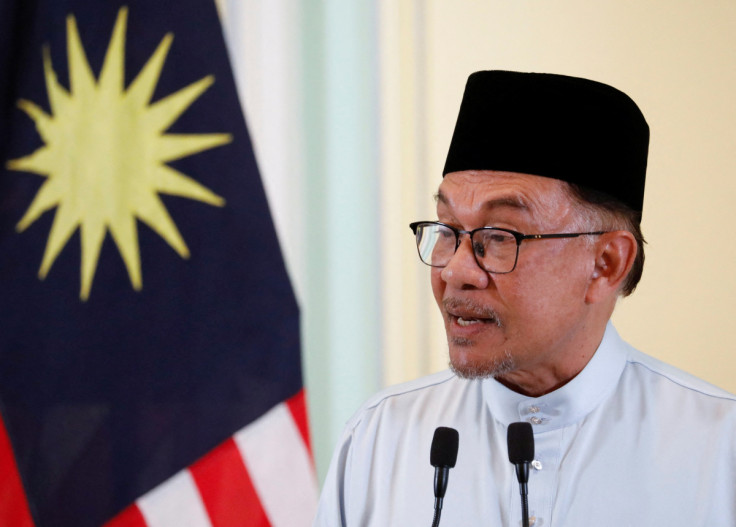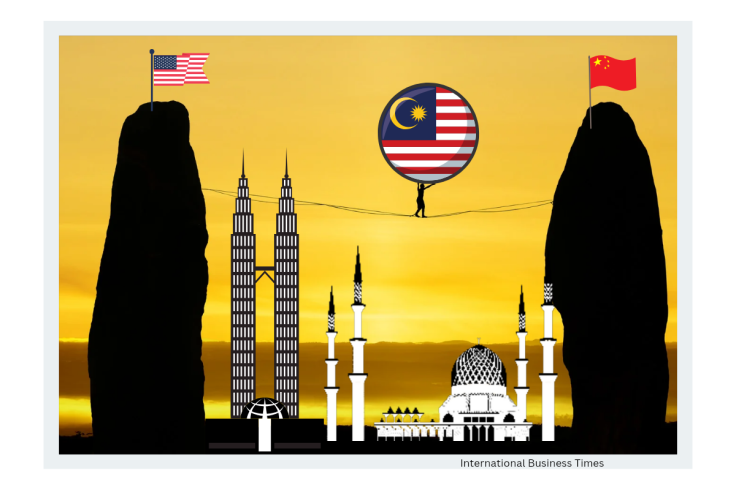
KEY POINTS
- Anwar told FT last month that Malaysia won't "pick a quarrel with China" and denounced "China-phobia"
- He also called for "empathy" for China, and said Malaysia shouldn't be prevented from being friendly with Beijing
- Anwar's "willful obliviousness" to Xinjiang and China's SCS aggression may backfire: University of Nottingham Malaysia's William Case
In rising Southeast Asia, where a battle for hegemony between Washington and Beijing has intensified in recent years, Malaysia under Prime Minister Ibrahim painted his country as a neutral force. In the past few weeks though, he has been increasingly vocal of the path Malaysia will take in the rivalry under his rule: one that he deems may be best for the economically struggling nation, but could push it further away from the West and closer to its Asian neighbor.
Late in February, Anwar told Financial Times that Malaysia doesn't need to "pick a quarrel" with China. "Why must I be tied to one interest? I don't buy into this strong prejudice against China, this China-phobia," he said.
"China-phobia," as Anwar labeled anti-Chinese sentiment, has "long been evident in the West," William Case, professor and head of the University of Nottingham Malaysia Campus' School of Politics, History and International Relations, told International Business Times. There is no "rising tide" of such anti-China sentiment in Malaysia at this point, but there is "growing mistrust" among the public over Beijing's decisions under Xi Jinping, he said.
There are concerns about China's military assertiveness in the South China Sea, partnered with the nation's "unanticipated economic frailties." Finally, there's the Xi administration's "many policy missteps," Case added. He noted that there is no recent polling about specific Malaysian sentiment regarding China – a 2022 Pew Research Center poll being the latest study that showed majority of Malaysians still think economic relations with China should be strengthened "even if it means not addressing human rights issues."

Anwar was far from done in his comments regarding the U.S.-China rivalry as he said earlier this month at the Association of Southeast Asian Nations (ASEAN) summit in Melbourne that China "seems to be the leading investor into Malaysia." He insisted that the Malaysian public does "not have a problem with China." He went on to call on other ASEAN members to not take sides in the U.S.-China feud.
His use of such language comes at a time when Malaysia's economy has stalled. For the full year 2023, the Malaysian economy expanded only at 3.7%, failing to beat expectations. The economic expansion rate also marked a sharp drop from 2022's 8.7% growth.
For Case, "Anwar may be articulating a neutral policy perspective more volubly than other leaders in Southeast Asia. But this avoidance over choosing sides is pretty much a standard posture across the region." He pointed out that while there are varying views of China's missteps, aggression, and economic offerings, "Anwar speaks for many of them in his call for neutrality."
An example could be the Philippines, which has seen its territorial feud with China reach dangerous levels in recent months. Manila under President Ferdinand Marcos Jr. has been increasingly vocal of China's illegal activities in the West Philippine Sea, but has only lodged multiple diplomatic protests so far. It has pursued tighter defense ties with the U.S. and other allies but has also signaled that it's business as usual in terms of investments.
"In hedging their bets, Southeast Asian states continue to rely on the U.S. as counterweight for security," Case said. However, there is an apparent balancing act for many Southeast Asian nations. As far as trade is concerned, China is the Philippines' second-largest trading partner, while China is Malaysia's largest trading partner. Also, "Malaysia and Indonesia loathe the U.S. over its long-time support for Israel's behaviors while remaining mute over China's actions in Xinjiang," said Case.
When China released a new map last year – evolving into a 10-dash line from the already infamous nine-dash line – Malaysia was the first ASEAN nation to reject it. "Malaysia does not recognize China's claims in the South China Sea ... the map is in no way binding on Malaysia," the Malaysian foreign ministry said at the time. Malaysia has overlapping claims in the vast Spratly Islands, but unlike the Philippines, it has not lodged diplomatic protests in recent years.
Anwar's advocacy for neutrality – or his tendency of using wording that seemingly lean toward China – did not stop with the China phobia callout. He promoted "empathy" for China in a speech earlier this month, and called on countries to consider "a preference for leaders who are more transactional with the rest of the world." Finally, he said: "The Washington consensus is gradually eroding, if not altogether disappeared."
Case agreed that Anwar made a good point in underlining how American-led "neo-liberal forms of economic engagement" have evolved and now "militate strongly against market exchange." However, it would be a wise choice for the Malaysian leader to use "less emotive phraseology" when talking about China and instead focus on the potential growth gains that engaging with China can bring. "And, he should not completely lose sight of Xinjiang and the South China Sea. His willful obliviousness on these issues could come back to haunt him," he pointed out.
Anwar did say that Malaysia remains a "fiercely" independent nation, and will not "be dictated by any force." He said the country remains an "important friend" to Washington and Europe, but should not be prevented from making friends with China. The said statements may be taken as a sign of neutrality, but for Case, it would be an uphill climb for Anwar and the Malay-Muslim community to step back from its strongly pro-Palestinian stance. "They remain so heavily invested that it helps to shape their very identity," he said.
Anwar does herald the American investment into various Malaysian sectors, so from a Western perspective, he can still be reasoned with, Case added. The Malaysian prime minister has also called notions about him leaning toward Beijing as "not right and grossly unfair."
The 76-year-old two-time opposition leader reiterated to FT in the February interview that Malaysia is just "a small country struggling to survive in a complex world" and his goal is to "focus on what is best for us." After all, China pledged earlier last year that it will invest some $36 billion into Malaysia, including investments into the country's automotive and petrochemical industries.







